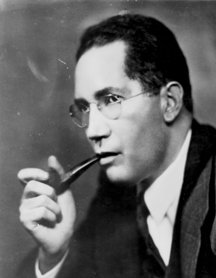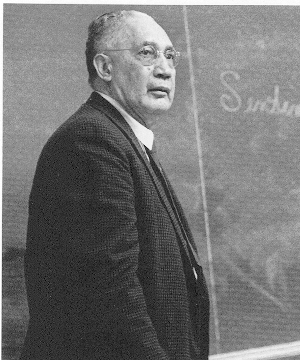|
 |
 |

|
| Sterling Allen Brown |
|
| ���O�G�q�� |
| ��O�GUnited States of America ���Q���X���� |
| ���ݮɴ��GThe 20th Century -- First Half �G�Q�@�� -- �e�b |
| ��ƴ��Ѫ̡GPhoto credit - Howard University |
|
|
|
Sterling Brown
 |
|
|
|

The
photo is from The
Ann
Arbor Poetry Forum 1996-1997
photo by Roy Lewis.
|
Sterling
Allen Brown (1901-1989)
| Sterling
Brown is one of the unsung heroes of African-American poetry. Born in
1901,
died in 1989, Brown spent most of his life as an English professor at
Howard
University, where he taught a wide range of courses from Shakespeare to
World Literature. While generations of students�XAmiri Baraka and
Gwendolyn
Brooks being two of the most famous�Xhave paid tribute to his
influential
teaching, his poetry was largely neglected during his lifetime. Brown
grew
up squarely in the black middle class of Washington, DC, but his
interest
in the lives of common folk took him from the lecture hall to the
barrel
house and the barbershop. While influenced by such American poetic
masters
as Robert Frost and Edgar Lee Masters, Brown's poems managed to
synthesize
traditional poetic forms with the dialect of working-class
African-Americans.
The
quote from Mark Patrick at At The
Ann Arbor Poetry Forum
1996-1997.
|
|
The
verses resonate with the music of the life he saw around him--the blues
sung to lost loves, chants of saints praying to be in the number,
tragic-comic
cries in the face of hatred and injustice, and jubilant songs of
endurance
and perseverance. Sterling Brown's poetic genius lies in his subtle
adaptation
of blues, spirituals, work songs, and ballads into silver threads that
dazzle his spoken verse.
The
quote is from Smithsonian
Folkways.
"In
the beginning I never found poems in the American literary pantheon
about
the things I knew best. I decided that I would at least do my part and
try to put some of those poems in there. At the time I was reading
black
American literature, mostly in anthologies. I didn't know about
Sterling
Brown. If I had, I would have taken a different approach...
"In
the 60s the critical thing in discovering the work of people who had
preceded
me was going to the folk archives of the San Francisco Library and
listening
to a recording of Sterling Brown and Robert Hayden. Not only did I get
a chance to follow that up by reading their poems in books and
anthologies,
but I also heard their voices. That transformed a lot of things for me.
I realized there was a musicality, a certain kind of artistic rigor
that
I hadn't heard before."
the
poet African American poet Michael Harper says at Brown
University Library.
|
| "Blues,
Ballads, and Social Songs."�� Seventy-five Years of Freedom.
Washington
DC: Library of Congress P, 1940. 17-25.
"The
Blues."�� Phylon, XIII (Autumn 1952),
318-327
|
Poems:
|
|
|
|
